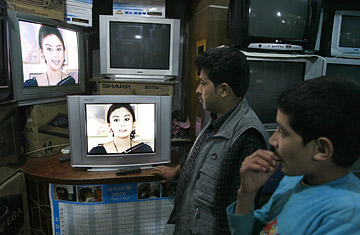
Afghans watch an Indian soap opera at a television shop in Kabul, Afghanistan.
"These serials are against Afghan culture. They are anti-Islamic and bad for the Afghan people," says Abdul Qadir, a 20 year-old student, on the government decision to ban the wildly popular Indian soap operas that have come to dominate Afghan TV during prime time. "People aren't working, they aren't studying, because of these serials." Yes, but Qadir freely admits he that for the past year, he has watched every nightly episode of Tulsi, the tale of an Indian housewife and mother more properly known as The Mother-in-Law Was Once a Daughter-in-Law Too. And now he supports the government closing down his show because he thinks he could be using his time better. Couldn't he just turn off the television? Qadir shrugs. "If there is TV, we will watch it. We do have self control, but..." He can't finish the thought. Nasrullah Mohammadi, a 23-year-old police officer, is more succinct. "It's like an addiction," he says. "It's the government's duty to stop this."
An informal poll of some three dozen men conducted on a Friday afternoon in Kabul's Shar-e-Naw Park found that all watched Tulsi, and all supported the government ban. That discrepancy, says Shoib Yaqoobi, a 20-year-old student who also works at a restaurant patronized by foreigners, is a sign of the immaturity of Afghan democracy. "No one knows what democracy is. They think it is wearing sexy clothes, watching TV, having fun and wasting time. But democracy is not just doing whatever you like. It is educating yourself to make choices. So now, the government needs to stop the serials in order to help the people."
The Afghan parliament this week passed a law banning Tulsi and competitor Bollywood serials such as Tests of Life and Waiting, calling them immoral, anti-Islamic and a threat to Afghan culture. Apparently nobody told the religious leaders who, during the Muslim fasting month of Ramadan last fall, petitioned broadcasters to delay Tulsi, in order to accommodate evening prayers. It wasn't just that the Mullahs were losing their flock to an Indian temptress; some made clear that they didn't want to miss an episode themselves.
Private TV networks have flourished since the 2001 ouster of the Taliban — which had banned television — and their staples have been imported dramas, news programs and homemade reality TV shows. Broadcasters were smashing taboos as quickly as they could find the staff: Women read the news, male and female DJs joked together on the radio, and would-be rock stars vied for attention in a nation that once banned music. Social conservatives grumbled, but appeared powerless in the face of insatiable demand that saw Tulsi garner an estimated viewership of some 10 million — one third of the population — according to broadcaster Tolo TV.
That prompted rival TV stations to acquire their own Indian serials, lured by their low cost and addictive appeal, and soon the impact of Bollywood was so ubiquitous that Afghan children were seen reenacting Hindu marriage rituals and prayers, while teenagers have taken to touching their elders' feet in a very non-Afghan sign of respect.
The opposition to this trend is hardly confined to conservatives: The government ban on the Bollywood serials passed by near unanimity in parliament, with support from U.S.-backed President Hamid Karzai.
Shukria Barakzai, one of the few parliamentarians who voted against the ban, sees it as a sign of government impotence in the face of real issues. "There is poverty, there is corruption and there is a lack of security. What bill is the parliament providing for that?" she asks. "Why are you stopping TV shows when you can't stop rape cases across the country? Why are you stopping women dancing on TV when you can't stop young boys dancing for the men who sexually abuse them? They do this because they have no other ideas."
So far two TV stations have pulled the "offending" serials, but Saad Mohseni, director of Tolo TV, has refused, calling the ban illegal and ill-defined. He may eventually have to acquiesce, although he has plenty of other programs to fill the gap. Tolo already airs the terror-themed Hollywood drama 24, while a Korean mini-series and an Afghan-made soap opera have proved popular. So, it's not the ratings effect of dropping Tulsi that worries him, Mohseni says; it's the precedent. "Is this going to cut back on what we enjoy, freedom of expression? The Indian shows go first, then they ban music, then women on TV. Once they get a taste of power, once they are successful with this, what stops them from going all the way? I can feel the Taliban breathing down my neck."
Indeed, some members of parliament recently proposed a ban on loud music, video games, billiards, playing with pigeons and public mingling between men and women — prohibitions familiar from the Taliban era. In January a university student was sentenced to death for an Internet posting questioning Islam's treatment of women. A few months earlier, a prominent journalist was jailed for translating the Koran into Dari, a local language. The trend worries Barakzai, prompting her to ask, "Why are we even bothering to fight the Taliban?"
